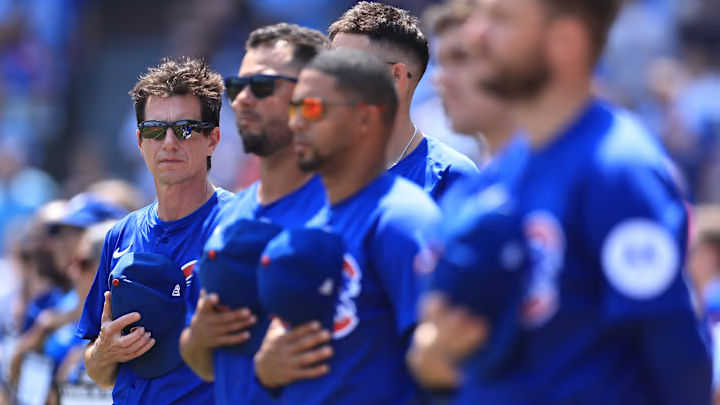The Milwaukee Brewers are up to a four-game lead in the NL Central with the easiest remaining strength of schedule in MLB. Against all odds, despite a penny-pinching ownership group and a stark lack of high-powered bats, the Brewers are threatening to run away with the No. 1 seed in the National League. What does that mean for the Chicago Cubs?
There's still a lot of baseball left, both in the regular season and the playoffs, but Chicago is losing ground. Quickly. The Cubs clearly have the talent necessary to compete in October, but after a near-silent trade deadline, Chicago is left with pressing questions about its pitching depth — not to mention holes elsewhere on the roster, such as third base.
If Chicago starts the Craig Counsell era with back-to-back finishes behind Milwaukee in the standings, these trade whiffs will stand out as we comb through Jed Hoyer's annual list of missed opportunities.
For more news and rumors, check out MLB Insider Robert Murray’s work on The Baseball Insiders podcast, subscribe to The Moonshot, our weekly MLB newsletter, and join the discord to get the inside scoop during the MLB season.
RHP Jhoan Durán, Minnesota Twins → Philadelphia Phillies
The Cubs were the team most often mentioned in opposition to the Philadelphia Phillies in the Jhoan Durán sweepstakes. In the end, it was Philly — one of Chicago's primary competitors in the NL postseason race — that wound up with an elite closer under contract through 2027. It came at a steep cost of two top-100 prospects in C Eduardo Tait and RHP Mick Abel, but it's a price worth paying for a shutdown reliever with Durán's... presence.
We will never get to see this at Wrigley Field, unfortunately.
Jhoan Duran entering the game for the first time as a Phillie at Citizens Bank Park was CINEMA pic.twitter.com/0lLFLoi8JY
— Jomboy Media (@JomboyMedia) August 2, 2025
Chicago's bullpen remains a serious weak point. Daniel Palencia has taken well to the closing role, but their depth pales in comparison to Philadelphia, Milwaukee and other NL heavyweights at full strength. The Cubs weren't completely inactive at the deadline, bringing in a pair of solid relievers in Taylor Rogers and Andrew Kittredge, but neither can deliver in high-leverage situations like Durán.
Switching between a fastball in the 100s and a deadly splinker in the high-90s, Durán offers a rare blend of power and finesse on the mound. He can rack up strikeouts and get tons of soft groundball contact. He might be the best closer in the NL right now and there's a good chance he ends up opposite Chicago in a playoff series, rather than helping the Cubs win come October.
3B Eugenio Suárez, Arizona Diamondbacks → Seattle Mariners
Third base remains the Cubs' biggest positional weak point. Matt Shaw has been better in recent weeks, but he's far from a reliable postseason weapon. Utilityman Willi Castro was a nice deadline add, but he's a pure depth piece — not the difference-maker Chicago so desperately needs at the hot corner.
Eugenio Suárez is not without his shortcomings as a 34-year-old, subpar defender on an expiring contract, but he's enjoying a magical season at the plate. Before the deadline, he led the National League in home runs. He's sitting as 36 moonshots with an .880 OPS and 138 wRC+ on the season.
While Chicago was never really going to re-sign Suárez in free agency with Kyle Tucker's own impending departure to stave off, he was worth the price as a high-powered rental. Suárez has struggled to find his footing since moving back to Seattle, but it's only a matter of time for one of the best power bats in baseball. Stacking Kyle Tucker, Seiya Suzuki, Pete Crow-Armstrong and Suárez in the heart of the Cubs lineup would've put that offense in Dodgers territory.
RHP Joe Ryan, Minnesota Twins
Joe Ryan was a popular trade candidate, especially once it became clear that the Minnesota Twins were listening to offers on literally anyone. In the end, no team came close enough to a lofty asking price. He's a controllable starter enjoying a Cy Young-level season, so Minnesota's reluctance to part ways is understandable. That said, Chicago has the prospect capital necessary to put a compelling package together. So why didn't they?
Well, because Jed Hoyer is notoriously risk-averse. It's his worst quality as a GM and it's why the Cubs feel less and less like top-tier contenders in the NL postseason race. Chicago opted for a far less dependable starting pitcher at the deadline in Michael Soroka, who left his Cubs debut after two innings and went to the IL with a shoulder injury. More bad luck for a bruised and battered Cubs rotation.
Shōta Imanaga and Matthew Boyd can headline a postseason rotation, but who's in that oh-so-critical third slot right now? Ben Brown? Cade Horton? The options are not ideal. Ryan would've immediately assumed the mantle of Chicago's top ace, giving them a wipeout starter to ride deep into the playoffs. It's a real "what could have been" situation, as Chicago feels so much more dangerous with Ryan headlining things.
